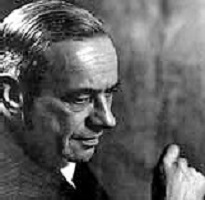Robert Strausz-Hupé
(Diplomat, deep state functionary) | |
|---|---|
 | |
| Born | 1903-03-25 Austria |
| Died | 2002-02-24 (Age 98) Newtown Square, Pennsylvania |
| Founder of | Foreign Policy Research Institute |
| Interests | • Geopolitics • world federalism |
Robert Strausz-Hupé was an Austrian-born U.S. diplomat and geopolitical theorist.
Life and career
Born in 1903 in Austria, Strausz-Hupé immigrated to the United States in 1923. Serving as an advisor on foreign investment to American financial institutions on Wall Street, he watched the Depression spread political misery across the America and Europe. After the Anschluss of Austria in 1938, Strausz-Hupé began writing and lecturing to American audiences on "the coming war." After one such lecture in Philadelphia, he was invited to give a talk at the University of Pennsylvania, an event which led to his taking a position on the faculty there in 1940. He became an Associate Professor in 1946.[1]
Strausz-Hupé founded the Foreign Policy Research Institute at the University of Pennsylvania in 1955, which later became independent in 1970. In 1957, the Institute published the first issue of Orbis, the quarterly journal that remains to this day the institute's flagship publication. Strausz-Hupé authored or co-authored several important books on international affairs. Strausz-Hupé was concerned that the Containment strategy was not up to the job against Communists, and deplored the "catastrophic half-measures" taken by the Johnson administration in Vietnam.[2]
Strausz-Hupé was a foreign policy advisor to Barry Goldwater when Goldwater was the Republican Party's candidate for President of the United States in 1964, and also advised Richard Nixon in his successful 1968 campaign. As president, Nixon appointed Strausz-Hupé to be Ambassador to Morocco in 1969, but the appointment was blocked by Arkansas Senator J. William Fulbright, head of the Foreign Relations Committee, on the grounds that Strausz-Hupé was too strongly against communism to function properly[3]. Despite this, the following year he was appointed U.S. Ambassador to Sri Lanka and the Maldive Islands, and subsequently served as ambassador to Belgium (1972–74), Sweden (1974–76), NATO (1976–77), and Turkey (1981–89).[4]
In the early 1980s, the Reagan administration implemented Strausz-Hupé’s strategy aimed at carrying the war to the enemy’s camp, be it in the Third World, Eastern Europe, or the Soviet Union itself, and targeting the enemy’s weaknesses through economic and technological pressures and a rhetoric of freedom that delegitimized Communist rule.[5]
In 1989, upon retirement after eight years as Ambassador to Turkey, Strausz-Hupé rejoined the Foreign Policy Research Institute as Distinguished Diplomat-in-Residence and president emeritus.
Strausz-Hupé died at home in Newtown Square, Pennsylvania, on February 24, 2002, at the age of 98.[6]
Opinions
- "As policy evolves towards several continental systems, and technology accentuates the strategic importance of large, contiguous areas. Thus the era of overseas empires and free world trade closes. If this reasoning is pushed to its absolute conclusion, the national state is also a thing of the past, and the future belongs to the giant state. Many nations will be locked in a few vast compartments. But in each of these one people, controlling a strategic area, will be master of the others." – Geopolitics: The Struggle for Space and Power (1942)
- As early as 1959 Strausz-Hupé was boldly asserting that the Cold War was merely “the contemporary expression” of a “pervasive conflict” that had enveloped the globe since 1914 when “the august, unchallenged, and tranquil glories of the Victorian Age” were shattered. The revolutionary era which followed, he wrote, would destroy the nation-state system. The only question was whether it would be replaced by universal chaos and tyranny or by “a universal political-legal order under Western leadership” based on “a voluntary federalism.”[7]
- “The issue before the United States,” he insisted, “is the unification of the globe under its leadership within this generation” . That was the only solution to the two threats hanging over humanity, neither of which was the Soviet Union, but rather the demographic and political explosions in Asia combined with nuclear proliferation.[8]
References
- ↑ https://www.nytimes.com/2002/02/26/world/robert-strausz-hupe-envoy-and-cold-war-stalwart-98.html
- ↑ https://www.fpri.org/article/1999/03/the-wisdom-of-robert-strausz-hupe/
- ↑ https://www.nytimes.com/2002/02/26/world/robert-strausz-hupe-envoy-and-cold-war-stalwart-98.html
- ↑ https://history.state.gov/departmenthistory/people/strausz-hupe-robert
- ↑ https://www.fpri.org/article/1999/03/the-wisdom-of-robert-strausz-hupe/
- ↑ https://www.nytimes.com/2002/02/26/world/robert-strausz-hupe-envoy-and-cold-war-stalwart-98.html
- ↑ Strausz-Hupé et al., Protracted Conflict (Philadelphia, Penn.: Foreign Policy Research Institute, 1959), pp. 10, 150.
- ↑ Robert Strauz-Hupé, “The Balance of Tomorrow,” Orbis, April 1957, pp. 14+27.